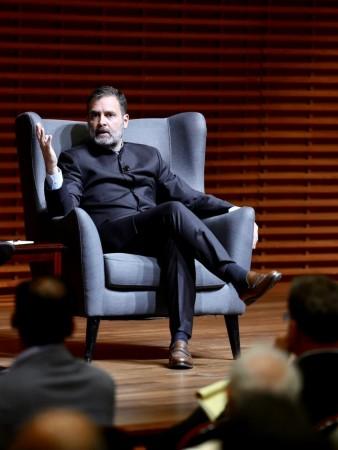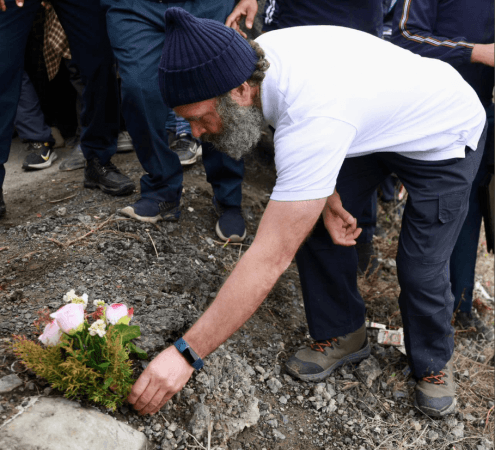In an impactful address at Stanford University, Congress leader Rahul Gandhi firmly asserted his view that the fight they face in India is solely their own and denied seeking any international support.
During his visit to the United States, Rahul Gandhi engaged with an audience at the California-based institution, where he was questioned about his stance on opposition parties from various countries seeking assistance from overseas allies.
In response, the former Member of Parliament unequivocally stated, "I am not actively seeking support from any individual or entity. It is abundantly clear to me that the battle we fight is ours alone."

Rahul Gandhi expressed his intention to engage with a group of young Indian students at Stanford University in order to forge meaningful connections and establish rapport.
"I believe it is my prerogative to do so, and I fail to comprehend why Prime Minister Narendra Modi has not undertaken a similar effort. The Prime Minister ought to address some challenging queries," remarked Rahul.
BJP's criticism
The Bharatiya Janata Party (BJP) has frequently criticized Rahul Gandhi for supposedly tarnishing the country's reputation on foreign soil. Earlier, the BJP condemned the former Congress president following his meeting with Chinese diplomats during the India-China conflict.
Rahul Gandhi arrived in San Francisco on Tuesday morning, commencing his visit to the United States. During his stay, he is scheduled to hold discussions with American lawmakers, engage with think tanks, and deliver lectures at the esteemed Harvard Club.
Due to his disqualification as a Lok Sabha MP, Rahul Gandhi is currently traveling with a regular passport, having surrendered his diplomatic passport. On Tuesday evening, he engaged with the Indian diaspora, fostering meaningful connections with the community.

Former Congress Rahul Gandhi has also said that he had never imagined that he would get maximum punishment in a defamation case and would be disqualified as an MP, but asserted that it has given him a lot of opportunity to work.
He said on Wednesday that "democracy isn't about opposition, it is about sacred institutions that support the opposition, and those institutions by the capture certainly want to change the role it is supposed to do."
Rahul Gandhi, who is on a six-day visit to the US said, "I don't think when I joined politics in 2004, I ever imagined what I see going on in our country. It was way outside the way I imagined. To be the first person to be given the first maximum sentence on defamation and maximum sentence to get disqualified. I didn't imagine that something like this was possible," the former Wayanad Lok Sabha MP said.
Maximum sentence in defamation case
"But then I think it's actually given me a huge opportunity, a much bigger opportunity I would have in Parliament. That is the way politics works," he said.
"I think the drama started really about six months ago. We were struggling, the entire opposition is struggling in India. Huge financial dominance, institutional capture, ...we were struggling to fight for the democratic rights in the country," he said, hitting out at the government.
"Then we decided... None of the system worked... democracy isn't about opposition, it's about sacred institutions that support the opposition. Those institutions by the capture certainly want to change the role it is supposed to play. So we decided to do something quite strange," Rahul Gandhi said, adding that then he along with his party leaders just decided to walk across the country (through Bharat Jodo Yatra).
"And we never imagined for a second what would happen when we walked across the country. What would happen not just politically, but in terms of the type of response we got, what would happen to us when we walked across our country.
"We started with 125 people ... and it fundamentally transformed the way we think about our country, our people, and politics.

"Lot of people asked me what are the lessons learnt from it. And for a long time I couldn't find an answer... I have picked up so much information about the country and what needs to be done. It was a beautiful experience of my life," he said, talking about the Bharat Jodo Yatra, which began from Tamil Nadu's Kanyakumari on September 7 last year and concluded in Jammu and Kashmir's Srinagar on January 30 after covering a distance of almost 4,000 km.
"We met, what would I best describe as the soul of the country, and very quickly a silence descended on us. It happened because we came in contact with people. We just stopped talking and we heard tears of immense suffering."
Rahul Gandhi discussed the story of a mechanic, who didn't have arms and how he showed he worked. "It shows a disconnect in politics, it is everywhere in India and US too. We experienced this multiple times.

"All the forces of the Government of India could do nothing and the more they applied force the more it grew.
"They have all the force, they have the system, power and they could not stop us. Force and power are completely two different things. Politicians are confused about the two. Power is an act of imagination, power comes when you go to the truth. We were weaving around the truth that's why they could not transfer that force into power.
Power vs Truth
"In Kashmir, they said if you walk for the last four days you will be killed. I said I want to see the person who wants to throw a hand grenade.
"You can see moments of power versus truth. Mahatma Gandhi fought the entire British empire, he had no force, while the British had all the force, army and the system. It doesn't matter how much force a person has. I am making this distinction for the transition we are facing."
While in California, Rahul Gandhi will also seize the opportunity to meet tech executives and students in Silicon Valley.
(With inputs from IANS)















